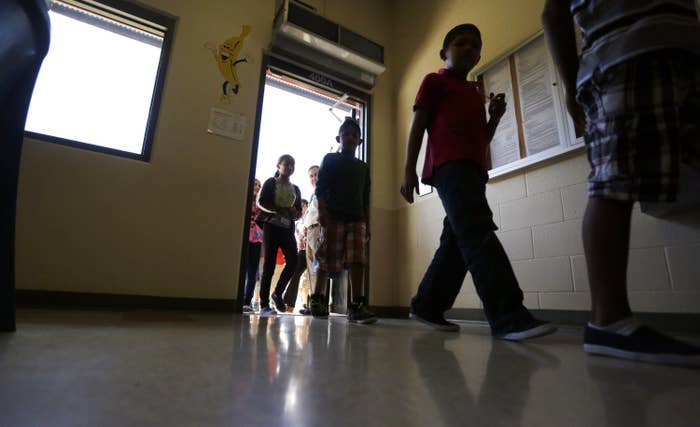
BuzzFeed News has reporters around the world bringing you trustworthy stories about the impact of the coronavirus. To help keep this news free, become a member.
The US government told a federal judge late Thursday that immigrant families should not be released from custody more than a week after children were ordered released from ICE detention centers across the country, setting up scenarios in which they could be separated.
The government’s position comes after a June 26 order by US District Judge Dolly Gee in a separate case to release immigrant children detained at ICE facilities for families by July 17. Citing COVID-19 concerns, Gee said Immigration and Customs Enforcement’s (ICE) family detention centers were “on fire” and that there was no more time for half measures to protect them from infection.
Attorneys for the Trump administration said the court should deny a motion for a preliminary injunction to promptly release all families in ICE detention.
Immigrant advocates said the government’s filing sets up a potential separation of children from their parents in custody should Judge James E. Boasberg agree.
“Parents will be forced to choose between separation and exposing their children to a deadly virus because the government refuses to release them unless the judge orders the families released together,” said Amy Maldonado, one of the attorneys on the case.
The lawsuit was filed in federal court in March as advocates sought the release of all families from three family detention centers located in Texas and Pennsylvania. The advocates said that the families were at risk of contracting COVID-19 while in custody, citing medical experts who said that social distancing measures were impossible in detention settings.
The government said ICE has implemented measures to mitigate the spread of the coronavirus and that the motion to immediately release families would fail to protect them from COVID-19.
“Petitioners would still be at risk of contracting COVID-19 while among the public at large,” the government argued.
Attorneys for ICE also denied allegations that it was incapable of protecting immigrant families from contracting COVID-19. But even if Judge Boasberg disagreed, the remedy would be to improve conditions inside the family detention centers, not order the release of parents and children.
Government attorneys pushed back against the claim that immigrant families face irreparable harm in being forced to choose between family separation or continued detention of children ordered released by Judge Gee.
“The court should, and must, reject petitioners’ attempt to recast this case as a case about family separation,” ICE attorneys said.
As of Thursday, there were 319 immigrants — at least 157 of which were children — in custody at the three family detention centers. At the Karnes County Residential Center in Karnes City, Texas, there are 24 current cases of COVID-19 among immigrant families detained there. There have been 35 total cases at the facility. There have been no positive cases at the other two ICE family detention centers.
Last month, Judge Gee, who oversees a 1997 court settlement known as the Flores agreement that says the government can't detain children for more than 20 days, ordered the release of immigrant minors at ICE facilities by July 17. Previously, an independent monitor tasked with tracking how children in family detention centers are treated as part of the court agreement, said the risk of immigrant minors and families contracting coronavirus inside one of the facilities continued to grow because some staffers failed to wear masks or observe social distancing requirements.
Gee referenced the spotty or total lack of compliance to wearing masks and social distancing in her order.
“I’m hoping it doesn’t take another dead child for the courts to take this seriously because we’ve had enough children die,” Maldonado said.

